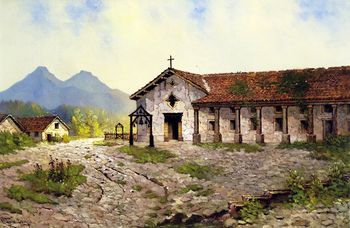Mission San Rafael Arcángel: Difference between revisions
Pat Palmer (talk | contribs) mNo edit summary |
mNo edit summary |
||
| Line 104: | Line 104: | ||
==Notes and references== | ==Notes and references== | ||
{{reflist|2}} | {{reflist|2}}[[Category:Suggestion Bot Tag]] | ||
Latest revision as of 06:00, 20 September 2024
| This article is part of a series on the Spanish missions in California  Mission San Rafael Arcángel, circa 1899.[1] | |
| HISTORY | |
|---|---|
| Location: | San Rafael, California |
| Coordinates: | 37° 58′ 27.6″ N, 122° 31′ 40.48″ W |
| Name as Founded: | La Misión del Gloriosísimo Príncipe San Rafael, Arcángel [2] |
| English Translation: | The Mission of the Glorious Prince, Archangel Saint Raphael |
| Patron Saint: | The Glorious Prince Saint Raphael, Archangel [3] |
| Nickname(s): | "Mission of Bodily Healing" [4] |
| Founding Date: | December 14, 1817 [5] |
| Founded By: | Father Vicente Francisco de Sarría [6] |
| Founding Order: | Twentieth [3] |
| Military District: | Fourth |
| Native Tribe(s): Spanish Name(s): |
Bay Miwok, Coast Miwok, Patwin Ohlone / Costeño |
| Primordial Place Name(s): | 'Anaguani [7] |
| SPIRITUAL RESULTS | |
| Baptisms: | 1,821 [8] |
| Marriages: | 519 [8] |
| Burials: | 652 [8] |
| Neophyte Population: | 300 [8] |
| Neophyte Population in 1832: | 1,361 [8][9] |
| Secularized: | 1834 [3] |
| Returned to the Church: | 1855 [3] |
| Caretaker: | Roman Catholic Archdiocese of San Francisco |
| Current Use: | Chapel / Museum |
| Current Land Area: | 6.5 acres |
| California Historical Landmark: | #220 |
| Web Site: | http://saintraphael.com |
Mission San Rafael Arcángel is a former religious outpost established by Spanish colonists on the west coast of North America in the present-day State of California (U.S. state). Founded on December 14, 1817 by Roman Catholics of the Franciscan Order as a medical asistencia ("sub-mission") of Mission San Francisco de Asís, the settlement was granted full mission status on October 19, 1822, thereby making it the twentieth in the twenty-one mission Alta California chain. In similar fashion, Mission San Francisco Solano was intended to be an adjunct of San Rafael but developed into a full-blown mission in its own right. Named after Saint Rafael the Archangel, the post was Alta California's first sanitarium. Designated as a California Historical Landmark, today the Mission serves as a museum and a chapel within the Roman Catholic Archdiocese of San Francisco.
History
Mission Period (1769 – 1833)
Mission San Rafael Arcángel was one of the first missions turned over to the Mexican government in 1833.
Rancho Period (1834 – 1849)
In 1840, there were 150 Indians still at the Mission. By 1844, Mission San Rafael Arcángel had been abandoned; what was left of the empty buildings was sold for $8,000 in 1846. The Mission was used by John C. Fremont as his headquarters during the battles to make California a United States of America possession.
In 1847, a priest was once again living at the Mission.
California Statehood (1850 – 1900)
President Franklin Pierce signed a proclamation in 1855 that restored ownership of the Mission proper to the Roman Catholic Church.[10] A new parish church was built near the old chapel ruins in 1861, and, in 1870, the rest of the ruins were removed to make room for the City of San Rafael. All that was left of the Mission was a single pear tree from the old Mission's orchard; it is for this reason that San Rafael is known as the "most obliterated of California's missions." [4]
20th century and beyond (1901 – present)
In 1949, Monsignor Thomas Kennedy rebuilt and restored the chapel, in the style of the original, but at a ninety degree (90°) change in orientation. Today, the Mission San Rafael Arcángel sits next to the Saint Raphael Parish of the Archdiocese of San Francisco, on the site of the original hospital. The City of San Rafael refers to itself as the "Mission City of Marin (County)."
Notes and references
- ↑ (PD) Painting: Edwin Deakin
- ↑ Leffingwell, p. 157
- ↑ 3.0 3.1 3.2 3.3 Krell, p. 295
- ↑ 4.0 4.1 Ruscin, p. 167
- ↑ Yenne, p. 174
- ↑ Ruscin, p. 196
- ↑ Ruscin, p. 195
- ↑ 8.0 8.1 8.2 8.3 8.4 Krell, p. 316: as of December 31, 1832; information adapted from Engelhardt's Missions and Missionaries of California.
- ↑ Engelhardt 1920, pp. 300-301: The smallest recorded neophyte population (383) was seen in 1783.
- ↑ Yenne, P. 178